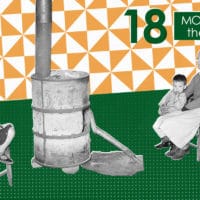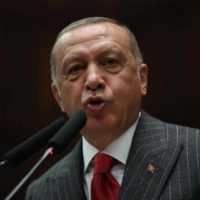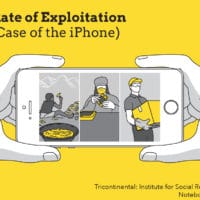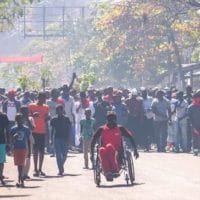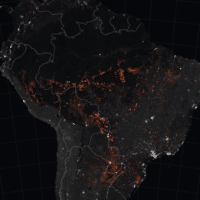-
Ireland is a racket (for foreign capital)
For 60 years Ireland has based its economy on attracting in foreign direct investment. And what’s has it got to show for it? One of the highest per capita national debts in the world and one of the highest rent regimes in the world.
-
Dossier 21: The neoliberal attack on rural India
If human agency, driven by a model of economics and development gone berserk, is a major driving factor in the changes upon us, there is plenty to be learned from this region and many like it.
-
The IMF convenes in Washington, deaf to the suffering it causes across the planet
No one within the IMF meeting will raise the question of democracy, both in terms of the IMF’s own functioning and in terms of the IMF’s relationship with sovereign countries around the world.
-
No Depression in Heaven with Alison Collis Greene
In this episode of Money on the Left, we speak with historian Alison Collis Greene about her book No Depression in Heaven with an eye toward contemporary debates around the Green New Deal. Subtitled The Great Depression, the New Deal, and the Transformation of Religion in the Delta, Greene’s book critiques what she calls the […]
-
Hands off Greta Thunberg!
Defenders of capitalism, joined by some on the left, are attacking the young woman who has become the symbol of a mass movement. Our place is by her side.
-
The Berlin Wall thirty years later
Even thirty years have not accustomed all ex-GDR citizens to seeing youngsters in the streets with their ragged dogs and paper cups for charitable donations, concert violinists begging money with Mozart in cold subway stations or, on icy nights, homeless huddled figures in sleeping bags on the stations’ concrete floors.
-
Navigating Educational Empowerment Through Life Conditions: A Study of Rural Women in Indian Punjab
Though the voices of rural women in India are some of the least heard, they are not mere passive victims. Many rural women strongly condemn their marginalization and pauperization—highlighting the flawed and biased developmental polices of the state, which they hold largely responsible for their hardships.
-
What to expect from Turkey’s coming invasion of Syria
Erdogan’s government is preparing to enter Syria for a major military operation against the Syrian Democratic Forces (SDF), which is made up largely of Kurdish factions who set up this armed force to defend the mainly Kurdish enclave in northern Syria.
-
Capitalism ‘solves’ the Nitrogen Crisis: A brief history
Part Three of Ian Angus’s examination of the disruption of the global nitrogen cycle by an economic system that values profits more than life itself.
-
Playing the Trump card
Clearly, the ingredients of anti-Trump cooking create a very mixed batter. Some spoonfuls may even contain a “Save Biden as candidate” flavor, outweighing the truly weighty reasons for baking a completely new kind of cake.
-
Notebook #2: The Rate of Exploitation
The rate of exploitation in the production of Apple’s iPhone X, which stands at 2458%, is 25 times the rate of exploitation that is gleaned from Marx’s examples in Capital, published in 1867.
-
The Venceremos Brigade at 50
As the U.S. ramps up its global efforts to protect genocidal racial capitalism, it is a crucial time for a new generation to study and learn from Cuba’s 60-year effort to build an alternative socio-economic system.
-
The Bidens, Trump, Kiev and impeachment
The impeachment drive is quickly gathering steam, and who can have any sympathy for that man in the Oval Office? But I wonder if some enthusiasts may not be digging deeply enough.
-
Greta Thunberg speech
Around the year 2030, we will be in a position where we probably set off an irreversible chain reaction beyond human control, that will most likely lead to the end of our civilization as we know it.
-
Marx in the Museum
One of Marx’s brightest concepts, perhaps his profoundest dialectical construct in Capital, is the “fetishism of commodities.” It emphasizes something very important about the foggy world of appearances and how can forget what lies within, behind what is immediately apparent. We can read it as a parable in which Marx tries to bring to life (and light) the “secret” of the ostensibly trivial commodity, the genie that exists within the magic bottle.
-
Music and film this time
The months ahead will show how many degree traces of the revolutionary spirit—exemplified by two recent events in Berlin—will somehow find their way into the Berlin and German political scenes.
-
Money Politics before the New Deal with Jakob Feinig
Jakob Feinig, assistant professor of human development at Binghamton University, joins Money on the Left to discuss the history of political organizing and activism around money in the United States, from the pre-Revolutionary period to the New Deal era. Characterized alternately by periods of widespread “silencing” and mass mobilization, the history of money politics that […]
-
“Down with the Rebels Against the Bill of Sale!”: Guy Endore’s Radical Reimagining of Haiti and Revolution
The American occupation of Haiti lasted from 1915–34. The U.S. subjected Haitians to the hated forced labor system of the corvée, seized control over Haitian finance, and rewrote the Haitian Constitution at gunpoint, enabling foreign companies to acquire land in the country. The distorting and oppressive impacts of the U.S. occupation have been felt in Haitian society ever since.
-
Dossier no. 20: When you ill-treat the African people, i see you
The Industrial & Commercial Workers’ Union (ICU)—a trade union, rural peasant movement, and urban squatters’ movement—formed on the docks in Cape Town in 1919. Within a decade, the ICU had expanded across Southern Africa without regard for national borders and counted people from various African countries and the Caribbean in its leadership, as well as people who were Indian and mixed race. The largely forgotten history of the ICU is well worth recovering in a time of escalating chauvinism and xenophobia. Our Dossier #20 offers an introduction to this extraordinary popular movement.
-
Understanding the fires in South America
Extractivist governments are stoking destruction in the Amazon and beyond. International alliances and Indigenous technologies can help protect the biome and support its 30 million inhabitants.




